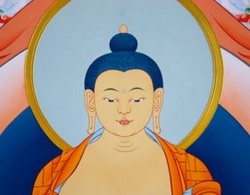Difference between revisions of "Critique of modern Zen"
(Created page with " Does {{Wiki|modern}} Zen resemble the Zen (C. Ch'an) of old China? It would seem that it doesn't. While many {{Wiki|modern}} day practitoners, who freq...") |
|||
| Line 1: | Line 1: | ||
| + | <nomobile>{{DisplayImages|270|2955}}</nomobile> | ||
| Line 6: | Line 7: | ||
| + | Does {{Wiki|modern}} [[Zen]] resemble the [[Zen]] (C. [[Ch'an]]) of old [[China]]? It would seem that it doesn't. While many {{Wiki|modern}} day practitoners, who frequent [[American]] [[Zen centers]] believe, to the contrary, that it does there is no historic {{Wiki|evidence}} that this is the case. First, it is a [[fallacy]] to think that early [[Zen]] was a school of [[meditation]] (S. [[dhyaana]], C. [[Ch'an]], J. [[Zen]]). | ||
| − | + | The [[word]] *[[Ch'an]]* (J. [[Zen]]) was reinterpreted in the [[Sung period]] to mean "[[enlightenment]]", not [[meditation]]. In fact, followers of [[Ch'an]] (J. [[Zen]]) in the Sung denied that their [[tradition]] [[taught]] [[meditation]]. They argued that [[Zen]] was {{Wiki|synonymous}} with [[Buddha Mind]], as an [[enlightenment]] [[tradition]] transmitted outside the common [[teaching]]; and had little or nothing to do with practicing [[meditation]] (C. hsi-ch'an). | |
| − | Even a close {{Wiki|examination}} of the [[word]] *[[dhyaana]]*, in {{Wiki|light}} of [[traditional]] [[Buddhist practices]], reveals that [[seated meditation]] is not suggested in the meaning of this [[word]]. In [[Sanskrit]], the [[word]] merely expresses the [[ideas]] of contemplation, {{Wiki|reflection}}, and [[mental concentration]], being more akin to the {{Wiki|Greek}} meaning of *theoria*. What is lost [[sight]] of in the {{Wiki|modern}} day practices of [[Zen]], is that [[Zen's]] [[traditional]] goal is the [[realization]] of [[Buddha Mind]]. Consequently, any and all [[forms]] of [[meditation]] must be subordinate to the goal at hand, namely, [[enlightenment]]. [[Meditational]] [[forms]] can never become the goal itself. Historically {{Wiki|speaking}}, many [[Zen]] {{Wiki|priests}} became [[enlightened]] during work, rather than during [[seated meditation]]; or from reading, as was the case with the great [[Hakuin]] (1685-1768). | + | Even a close {{Wiki|examination}} of the [[word]] *[[dhyaana]]*, in {{Wiki|light}} of [[traditional]] [[Buddhist practices]], reveals that [[seated meditation]] is not suggested in the meaning of this [[word]]. In [[Sanskrit]], the [[word]] merely expresses the [[ideas]] of contemplation, {{Wiki|reflection}}, and [[mental concentration]], being more akin to the {{Wiki|Greek}} meaning of *theoria*. What is lost [[sight]] of in the {{Wiki|modern}} day practices of [[Zen]], is that [[Zen's]] [[traditional]] goal is the [[realization]] of [[Buddha Mind]]. |
| + | |||
| + | Consequently, any and all [[forms]] of [[meditation]] must be subordinate to the goal at hand, namely, [[enlightenment]]. [[Meditational]] [[forms]] can never become the goal itself. Historically {{Wiki|speaking}}, many [[Zen]] {{Wiki|priests}} became [[enlightened]] during work, rather than during [[seated meditation]]; or from reading, as was the case with the great [[Hakuin]] (1685-1768). | ||
{{Wiki|Modern}} [[Zen]], its practice, is chiefly [[Soto]]. But more specifically, it revolves around the strange teachings of [[Dogen Zenji]]. The often murky writings of [[Dogen]], have their appeal to a certain type of Zennist; but what [[Dogen]] says about [[Zen]], nevertheless, has to be examined and tested against [[Zen's]] historical and [[spiritual]] {{Wiki|culture}}. [[Japanese Zen]] has another [[tradition]] besides that of [[Dogen Zenji]], the father of that [[lineage]] being Bu'nan Shidoo (Munan) whose [[vision]] gave [[birth]] to the great [[Hakuin]] [[Zenji]]. Bu'nan, to change the [[subject]] somewhat, reads differently than [[Dogen]]. For one thing, he is clear rather than obscure. | {{Wiki|Modern}} [[Zen]], its practice, is chiefly [[Soto]]. But more specifically, it revolves around the strange teachings of [[Dogen Zenji]]. The often murky writings of [[Dogen]], have their appeal to a certain type of Zennist; but what [[Dogen]] says about [[Zen]], nevertheless, has to be examined and tested against [[Zen's]] historical and [[spiritual]] {{Wiki|culture}}. [[Japanese Zen]] has another [[tradition]] besides that of [[Dogen Zenji]], the father of that [[lineage]] being Bu'nan Shidoo (Munan) whose [[vision]] gave [[birth]] to the great [[Hakuin]] [[Zenji]]. Bu'nan, to change the [[subject]] somewhat, reads differently than [[Dogen]]. For one thing, he is clear rather than obscure. | ||
| Line 23: | Line 27: | ||
Also, it is rather curious that most [[Zen centers]] make little or no mention of the *stages of a [[Bodhisattva]]*, nor is there any mention of what actually constitutes the credentials of a genuine [[Bodhisattva]]; that, in fact, the rank of a [[Bodhisattva]] only occurs in the [[ecstasy]] of *[[bodhicitta]]*. Yet, [[traditional]] [[Zen]] never departed from the [[Bodhisattva path]] and strove to met the demands of the [[path]]. | Also, it is rather curious that most [[Zen centers]] make little or no mention of the *stages of a [[Bodhisattva]]*, nor is there any mention of what actually constitutes the credentials of a genuine [[Bodhisattva]]; that, in fact, the rank of a [[Bodhisattva]] only occurs in the [[ecstasy]] of *[[bodhicitta]]*. Yet, [[traditional]] [[Zen]] never departed from the [[Bodhisattva path]] and strove to met the demands of the [[path]]. | ||
| − | + | Now, {{Wiki|modern}} [[Zen]] has lapsed into anti-intellectualism concerning the study of [[Dharma]] and the [[Bodhisattvic]] [[path]]. Some even hold that it is [[merit]] not to read [[traditional]] [[Buddhist literature]]. Moreover, some practitioners believe it a [[virtue]] to act unreasonable, as if [[insanity]] were the mark of [[enlightenment]]. Some [[Buddhists]], like myself and others, are very displeased with this new trend. However, we don't blame it on the practitioners. It is rather the fault of their [[teachers]] who [[suffer]] from [[religious]] [[ignorance]]. | |
Latest revision as of 23:56, 5 August 2017
Does modern Zen resemble the Zen (C. Ch'an) of old China? It would seem that it doesn't. While many modern day practitoners, who frequent American Zen centers believe, to the contrary, that it does there is no historic evidence that this is the case. First, it is a fallacy to think that early Zen was a school of meditation (S. dhyaana, C. Ch'an, J. Zen).
The word *Ch'an* (J. Zen) was reinterpreted in the Sung period to mean "enlightenment", not meditation. In fact, followers of Ch'an (J. Zen) in the Sung denied that their tradition taught meditation. They argued that Zen was synonymous with Buddha Mind, as an enlightenment tradition transmitted outside the common teaching; and had little or nothing to do with practicing meditation (C. hsi-ch'an).
Even a close examination of the word *dhyaana*, in light of traditional Buddhist practices, reveals that seated meditation is not suggested in the meaning of this word. In Sanskrit, the word merely expresses the ideas of contemplation, reflection, and mental concentration, being more akin to the Greek meaning of *theoria*. What is lost sight of in the modern day practices of Zen, is that Zen's traditional goal is the realization of Buddha Mind.
Consequently, any and all forms of meditation must be subordinate to the goal at hand, namely, enlightenment. Meditational forms can never become the goal itself. Historically speaking, many Zen priests became enlightened during work, rather than during seated meditation; or from reading, as was the case with the great Hakuin (1685-1768).
Modern Zen, its practice, is chiefly Soto. But more specifically, it revolves around the strange teachings of Dogen Zenji. The often murky writings of Dogen, have their appeal to a certain type of Zennist; but what Dogen says about Zen, nevertheless, has to be examined and tested against Zen's historical and spiritual culture. Japanese Zen has another tradition besides that of Dogen Zenji, the father of that lineage being Bu'nan Shidoo (Munan) whose vision gave birth to the great Hakuin Zenji. Bu'nan, to change the subject somewhat, reads differently than Dogen. For one thing, he is clear rather than obscure.
To illustrate the strangeness of Soto *sitting methodologies*, I am sure all of you remember the anecdote where Nan-yueh likens his disciple Ma-tsu's zazen to the futility of polishing a tile in order to make a mirror, pointing out the limitation of seated meditation (knowing whether to whip the cart or the horse). So what does the genius Dogen Zenji say about this particular anecdote? He argues that the act of polishing, in fact, creates a mirror out of a tile! Just in the same way that sitting on a zafu makes one a living Buddha! Actually, here are Dogen's words:
"We truly know that when we make a mirror by polishing a tile, Ma-tsu becomes a buddha. When Ma-tsu becomes a buddha, Ma-tsu immediately becomes Ma-tsu. When Ma-tsu becomes Ma-tsu, zazen immediatley becomes zazen."
Maybe the foregoing explains the general irrationality of most modern Zen temples (with the exception of Ch'an and Son traditions). It would also seem that Dogen is quite ignorant of Buddhism. Generally speaking, the Five Aggregates (skandhas), making up the physical body, including the senses and consciousness (vijnaana), are not regarded to be vehicles (yanas) though which enlightenment is accomplished. The real question for orthodox Zen was WHO held up this half-alive corpse? And WHO is fixated to the Five Aggregates, constituting the ego-form?
The extreme emphasis, in modern Zen centers, on seated meditation alone will not advance a student of Buddhism to the level of wisdom the Buddha attained under the Bo- tree. Without extensive Sutra study and proper instruction in Dharma, no actual advance can be made to the other shore of intuitive wisdom.
Also, it is rather curious that most Zen centers make little or no mention of the *stages of a Bodhisattva*, nor is there any mention of what actually constitutes the credentials of a genuine Bodhisattva; that, in fact, the rank of a Bodhisattva only occurs in the ecstasy of *bodhicitta*. Yet, traditional Zen never departed from the Bodhisattva path and strove to met the demands of the path.
Now, modern Zen has lapsed into anti-intellectualism concerning the study of Dharma and the Bodhisattvic path. Some even hold that it is merit not to read traditional Buddhist literature. Moreover, some practitioners believe it a virtue to act unreasonable, as if insanity were the mark of enlightenment. Some Buddhists, like myself and others, are very displeased with this new trend. However, we don't blame it on the practitioners. It is rather the fault of their teachers who suffer from religious ignorance.

